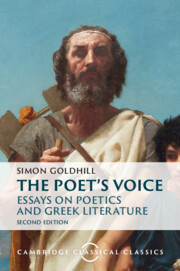Book contents
- Frontmatter
- Contents
- Foreword
- Preface
- Introduction: sounding out The Poet’s Voice
- 1 The poet hero: language and representation in the Odyssey
- 2 Intimations of immortality: fame and tradition from Homer to Pindar
- 3 Comic inversion and inverted commas: Aristophanes and parody
- 4 Framing, polyphony and desire: Theocritus and Hellenistic poetics
- 5 The paradigms of epic: Apollonius Rhodius and the example of the past
- Bibliography
- Index
4 - Framing, polyphony and desire: Theocritus and Hellenistic poetics
Published online by Cambridge University Press: 31 October 2024
- Frontmatter
- Contents
- Foreword
- Preface
- Introduction: sounding out The Poet’s Voice
- 1 The poet hero: language and representation in the Odyssey
- 2 Intimations of immortality: fame and tradition from Homer to Pindar
- 3 Comic inversion and inverted commas: Aristophanes and parody
- 4 Framing, polyphony and desire: Theocritus and Hellenistic poetics
- 5 The paradigms of epic: Apollonius Rhodius and the example of the past
- Bibliography
- Index
Summary
I loathe everything to do with The People,’ writes Callimachus, and this (public) turning away from the public poetry of the fifth century is a stance, a gesture, repeated in a multiformity of guises throughout the texts of the Hellenistic period. Although the practices of literary production, performance and circulation are known in even less detail for this period than for the fifth century (and many questions about, say, the constitution of the public of Hellenistic literature are simply not answerable with any security), none the less there are much-discussed and highly significant shifts both in the conditions of literary production and in the presentation of the poet’s voice which require some brief introductory remarks.
Keywords
- Type
- Chapter
- Information
- The Poet's VoiceEssays on Poetics and Greek Literature, pp. 223 - 283Publisher: Cambridge University PressPrint publication year: 2024

